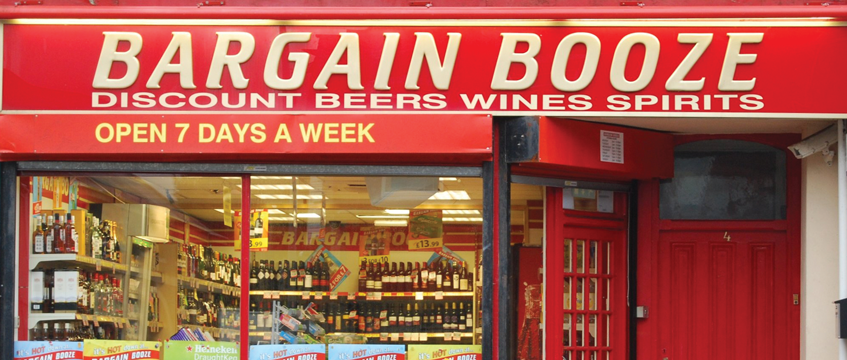As much as 1m sq ft of high street retail space could be at risk if Bargain Booze owner Conviviality goes into administration.
The retail business, which also owns the high street chain Wine Rack, has said that it is planning to appoint administrators following a profit warning, a forgotten £30m tax bill and failure to raise an emergency £125m cash injection.
Molly Johnson-Jones, retail analyst at GlobalData, said: “At a time of tough trading conditions when companies need to focus on their best performing core areas, Conviviality took its eye off the ball in search of new growth. Add in the accounting errors and hidden margin erosion and we can see the reasons for Conviviality’s demise.”
See below for the full data from EG:
How is its portfolio structured?
There are 616 stores operating under Bargain Booze in the UK, totalling around 908,600 sq ft in total, according to EG data. Of these, 370 are operated as franchises, totalling 545,750 sq ft. There are 30 Wine Rack stores, nine of which are in London.
If the business goes into administration then the Bargain Booze stores which do not operate under the franchise model would be most at risk of closure. Conviviality owns these under finance leases and is responsible for 246 stores.
However, the 370 franchises could have the option to continue to run their shops by switching supplier. Franchisees would then also have the option to run their shops either under the Bargain Booze brand or they could have the option of rebranding.
The average size of a Bargain Booze store is around 1,475 sq ft. The majority of Bargain Booze stores are in the North West, with 42% of the portfolio in the region. Liverpool has the most Bargain Booze stores with 32, followed by Stoke-On-Trent (29) and Nottingham (15).
Smaller, local towns will be the most affected by the loss of another national multiple retailer on the high street. Many of these will be able to be re-let, but the main demand will come from local businesses, meaning landlords in some areas may suffer from the loss of a quality covenant.
Convenience store Spar is understood to have approached a number of outlets in larger towns and cities.
What went wrong?
Administrators at PwC are expected to be appointed within the next 10 days and it is thought that a break up and sale of the separate businesses is the most likely option.
The retailer’s chief executive Diana Hunter stepped down on 19 March. She had been in charge since 2013 when the company listed on the stock exchange as an alcohol, impulse and tobacco wholesaler.
Under Hunter’s leadership the business expanded rapidly. In 2015 Conviviality acquired wholesaler Matthew Clarke for £200m and in 2016 it bought upmarket wine specialist Bibendum.
It also acquired newsagent chain Central Convenience from insolvent tobacco retailer P & H last year, as well as a stake in Peppermint which runs bars at festivals.
Earlier this month the business cut its forecast for underlying earnings for the year from £55m to £70m. On 14 March it revealed a £30m tax bill that was due to be paid at the end of the month.
Find out everything you need to know about the current retail crisis
By 28 March the company had failed to raise an emergency £125m from shareholders. It announced its intention to appoint administrators the following day.
Johnson-Jones said: “Under Diana Hunter, who resigned last week, the business acquired Matthew Clark and Bibendum to move further into wholesale, and Peppermint to try to broaden its reach into the events business.
“Although discount and wholesale retailing has been more resilient than the rest of UK retail, aggressive expansion in a cost inflationary environment is a risky move. If the business had seen the severe margin erosion which had occurred, rather than the inflated EBITDA number which was reported due to error, then moves could have been made to cut costs and storm-proof the business.
“However, this was missed and the acquisitions continued, with 25 P&H stores acquired at the end of 2017.
“Such high levels of space addition would have provided a detrimental impact to Conviviality’s sales densities.
“Combining the margin erosion from inflation throughout the supply chain with declining sales densities is a recipe for disaster. Other F&G retailers (even the discounters to a lesser extent) have chosen to focus on improving sales densities in this inflationary environment rather than aggressively expanding.”
In a statement, Conviviality said: “Unless circumstances change, and in accordance with statutory requirements, the Board intend to appoint administrators within 10 business days. The secured creditors can, however, appoint administrators without the requirement for notice.”
To send feedback, e-mail amber.rolt@egi.co.uk or tweet @AmberRoltEG or @estatesgazette











